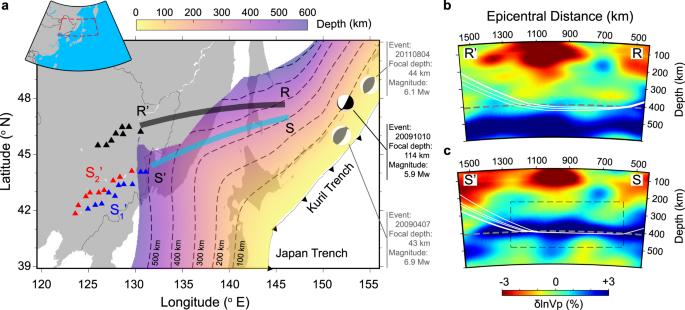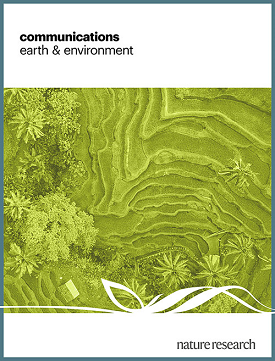Ultra-low-velocity anomaly inside the Pacific Slab near the 410-km discontinuity
IF 8.1
1区 地球科学
Q1 ENVIRONMENTAL SCIENCES
引用次数: 0
Abstract
The upper boundary of the mantle transition zone, known as the “410-km discontinuity”, is attributed to the phase transformation of the mineral olivine (α) to wadsleyite (β olivine). Here we present observations of triplicated P-waves from dense seismic arrays that constrain the structure of the subducting Pacific slab near the 410-km discontinuity beneath the northern Sea of Japan. Our analysis of P-wave travel times and waveforms at periods as short as 2 s indicates the presence of an ultra-low-velocity layer within the cold slab, with a P-wave velocity that is at least ≈20% lower than in the ambient mantle and an apparent thickness of ≈20 km along the wave path. This ultra-low-velocity layer could contain unstable material (e.g., poirierite) with reduced grain size where diffusionless transformations are favored. An ultra-low seismic velocity region that may contain unstable mineral phases exists within the cold Pacific slab near the 410-km discontinuity at the Kuril subduction zone, according to analyzes of P-wave travel times and waveforms from dense seismic arrays.

410公里不连续面附近太平洋板块内的超低速异常。
地幔过渡带的上边界,被称为“410公里不连续面”,归因于矿物橄榄石(α)向瓦德橄榄岩(β橄榄石)的相变。在这里,我们对密集地震阵列中的三重P波进行了观测,这些地震阵列限制了日本海北部410公里不连续面附近俯冲太平洋板块的结构。我们对周期短至2的P波传播时间和波形的分析 s表示冷板中存在超低速层,P波速度至少比周围地幔低≈20%,表观厚度≈20 沿着波浪路径公里。这种超低速层可能包含晶粒尺寸减小的不稳定材料(例如,铁橄榄石),其中有利于无扩散转变。
本文章由计算机程序翻译,如有差异,请以英文原文为准。
求助全文
约1分钟内获得全文
求助全文
来源期刊

Communications Earth & Environment
Earth and Planetary Sciences-General Earth and Planetary Sciences
CiteScore
8.60
自引率
2.50%
发文量
269
审稿时长
26 weeks
期刊介绍:
Communications Earth & Environment is an open access journal from Nature Portfolio publishing high-quality research, reviews and commentary in all areas of the Earth, environmental and planetary sciences. Research papers published by the journal represent significant advances that bring new insight to a specialized area in Earth science, planetary science or environmental science.
Communications Earth & Environment has a 2-year impact factor of 7.9 (2022 Journal Citation Reports®). Articles published in the journal in 2022 were downloaded 1,412,858 times. Median time from submission to the first editorial decision is 8 days.
 求助内容:
求助内容: 应助结果提醒方式:
应助结果提醒方式:


